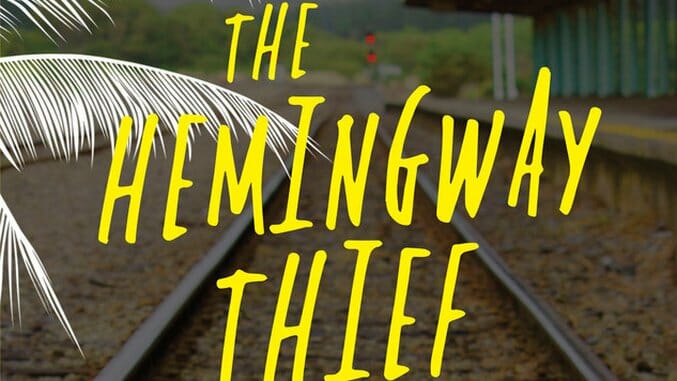
Shaun Harris’ debut novel, The Hemingway Thief, contains the typical ingredients of compelling crime fiction: Mexican drug cartels, down-and-out Yanqui hotheads, merciless thugs and gun-slinging bounty hunters. But it’s originality stems from combining these elements with a stolen Ernest Hemingway manuscript—an early draft of A Moveable Feast. The manuscript boasts a lost chapter that could lead to the infamous suitcase stolen from Hemingway’s wife on a train in 1922. The bag’s contents? Hemingway’s unpublished short stories.
Hemingway fans and scholars have obsessed over the lost material for decades, and Harris isn’t the first writer to build a book around the suitcase incident (science fiction writer Joe Haldeman did so in his parallel-worlds novella The Hemingway Hoax in 1991). But The Hemingway Thief expropriates the incident differently, fashioning itself into the kind of literary thriller mélange crafted by Harris’ Seventh Street Books imprint-mate Gordon McAlpine in Hammett Unwritten.
 Harris’ book rewards crime novel fans with more brutality and less metafictional sleight-of-hand than McAlpine’s novel, along with comic blustering and an undisciplined onslaught of gratuitous pop culture references. A tasteful editor likely would have cut most of these references, but someone at Seventh Street must have recognized them as true to the narrator’s artless storytelling persona and wisely left them intact.
Harris’ book rewards crime novel fans with more brutality and less metafictional sleight-of-hand than McAlpine’s novel, along with comic blustering and an undisciplined onslaught of gratuitous pop culture references. A tasteful editor likely would have cut most of these references, but someone at Seventh Street must have recognized them as true to the narrator’s artless storytelling persona and wisely left them intact.
We meet narrator Henry “Coop” Cooper at a derelict Baja hotel bar, where the American novelist has exiled himself to plot the murder/suicide of his literary nom de plume, Toulouse Velour. Much to his ongoing embarrassment, Coop (as Velour) has written 32 profitable pulp romance novels featuring a Scottish vampire detective. He’s produced a body of “chick lit” so convincing and popular with women that virtually everyone assumes the author is a woman. Coop is more than a little defensive about it, snapping with equal ferocity at episodes of gender misidentification and any mention of John Grisham. As the official author of a single, long-forgotten literary novel published under his own name, which garnered dismal reviews and worse sales, Coop, by his own admission, is “dead to the publishing world.”
When Coop and his drinking buddy Grady Doyle, a former DEA agent with his own dark secrets, intercede in the beating of an overmatched patron at the hotel bar, they’re drawn into a world of violence and intrigue involving the purloined Hemingway manuscript, a ruthless con artist, the drug lords who dominate the district, a camp of exiled “South-will-rise-again shit-kickers” led by the self-proclaimed great-great-grandson of John Wilkes Booth and the two most deadly professional hitwomen on the planet. Of course, Coop happens upon a story that may rescue him from pseudonymous pulp-romance Purgatory—if it doesn’t brutally murder him a half-dozen times before he figures out how it ends and puts it on paper.
Although Coop acknowledges being little more than a casual Hemingway fan—certainly a poor candidate to write anything Hemingway-centric until the stolen manuscript fell into his lap and the punishment for taking it came down on his head—he recognizes in a young Hemingway his own preoccupations with his inadequacy as a failed novelist:
Hemingway did have a decent job, a loving wife, and an interesting life in a major European city. If he had been an ordinary man it would have been more than satisfying, but Hemingway was not an ordinary man. He was a writer. Few professions draw such insecure, narcissistic, paranoid, depressive, and needy applicants as the writing life. The need to be published, to be validated, churns in the writer’s breast like a non-stop manic engine.
The saving grace—if one can call it that—of The Hemingway Thief is that Harris interrupts such meditative moments with a blow to the head or such mitigating cynical one-liners as “Then again just being in Idaho [at the time of his suicide] was probably enough to make him blow his brains out.” What makes The Hemingway Thief work so well as crime fiction, comedy and an undeniably entertaining novel-about-a-novelist is that it doesn’t so much favor one explanation as throw them both at the wall. Somehow, Harris makes them both stick.
Steve Nathans-Kelly is a writer and editor based in Ithaca, New York.